Meredith R. Lyons's Blog, page 3
November 10, 2023
Loving all this travel! Hate packing with the fiery passion of ten thousand suns.

I have cleaned entire kitchens, washed entire loads of laundry, reorganized desk drawers, all in the name of procrastinating packing for a trip. I know that this stresses me out and I’ve done everything I can to make it easier for myself.
I have a pre-made packing checklist that I use before each trip that helps me remember things that might slip my mind.
I have a box in my closet of travel things that I’ve accumulated.
Packing cubes.
Laundry bag.
Toiletries bag. WITH many travel toiletries forever pre-packed!
Travel corkscrew
Travel Library of Congress plastic wine tumbler. (Yes, you read that correctly.)
Cube of book swag items ready to go.
Certain outfits that I always wear to book events that are easy, no-brainer packs.
A jewelry box that is mainly prepacked.
You would think that I would be fine. I am not fine. I have nightmares before every trip. (Shut up, Jim. And everyone like Jim who claims to sleep dreamlessly through the nights.) This most recent trip I dreamed about the car falling off a cliff, the AirBnB being a double murder scene, and teenagers making fun of me.
I always plan to start packing days before I do. I know that I feel better once it’s done. The problem is that it cannot be done until the day before. HEAR ME OUT.
If you use any moisturizer, or shower in the morning, there are things that you cannot pack until the morning you leave.
If you run in the morning, you cannot pack your running shoes or certain accoutrement until the morning of your trip.
Foodstuffs.
Still, I’ve done this many times. I should be used to it by now. Why do I hate it so much?
I believe it’s because my mentality is always forward thinking. I had to do a lot of work to enable myself to appreciate the moment and I still have to sometimes consciously make myself stop and think. Thus I believe I hate packing because I have to mentally leap forward many days, and it is impossible to know what I will need for all of the days or how those days will go. Here’s a list of things that make packing even worse:
Seasonal shifts. Am I going from Tennessee to Illinois? I now have to adjust not only to a potential twenty degree drop, but fifty degrees in Illinois feels quite different from fifty degrees in Nashville. If you don’t believe me, I dare you to bike to work in both places in February.
This affects not just the clothes you’re going to wear every day, but it DOES affect the clothes you’re going to wear every day. Are you going to any nice event while you’re there? How nice? And will it be cold or hot inside? Layers? Do you have something that nice with layers? I COULD GO ON.
Exercise. Is there a gym where you’re going? If running is your sanity, will you be able to get on the gym’s treadmill when you need it or will there be only one and a dozen people fighting for it? Are there safe places to run if you get up before sunlight? Should you run with a knife in your hand? (I HAVE DEFINITELY RUN EIGHT MILES CLUTCHING A KNIFE.) Do you know how to get to the running places? Also, weather, what kind of running stuff will you need? Hats? Gloves? Jacket? Headlight?
Jackets. Just one? Cute or goes with everything? Shoes. Will there be snow? Rain?
Do you have the bra for that?
Trips more than two days.
What is the weather going to do if you’re there for five days or longer? (See previous bullet.)
Do you have access to a gym with weights? If not, can you pack a TRX?
Will you have laundry? If so, how much will it be? Where are you GOING TO EAT? (I’m pescatarian so this is sometimes an issue. I usually just back two dozen larabars and drop three pounds.)
Is it possible you will be starting your period during this time? If so, bring several different bra and underwear options because at this age, bra size can fluctuate two cups or more. Also bring lots of Advil and fingers crossed it’s not a really bad one.
Is this a book event?
Do you have all of the business cards, bookmarks, pens, lightup sign, charging cord for light up sign, newsletter signup, etc. that you need?
Will they have your books there or do you need to somehow bring them? If they are going to have your books there, will they really or should you bring some just in case? Will they have enough of your books there or should you bring some in case they run out?
Are you doing a presentation there? Do you need handouts and do you have them? Are they providing a projector? Do you have your slides downloaded in case there’s no Wi-Fi? Do you know your slides well enough in case nothing works at all and everything goes to hell and you just have to improv all by yourself in front of an audience of two to twenty people?
General considerations.
Are you flying or driving? If you’re flying you’re going to have to condense everything down and all of this will get ten times worse.
Do you need to bring a measuring spoon for your apple cider vinegar shot in the morning?
Can you pack all of your vitamins and magnesium without attracting a bag check?
Should you/can you bring booze?
Should you/can you bring weapons?
Will the coffee be bad? Will there be a nearby Starbuck that is not prohibitively expensive? (I’m looking at you, $8 drip coffee in San Diego.) Should you bring some Starbucks Instant coffee?
I could probably go on, but now you know exactly how neurotic I am. But If you hate packing too, and you have even more bullet points, I would love for you to add yours in the comments!
November 3, 2023
I used to dread autumn.
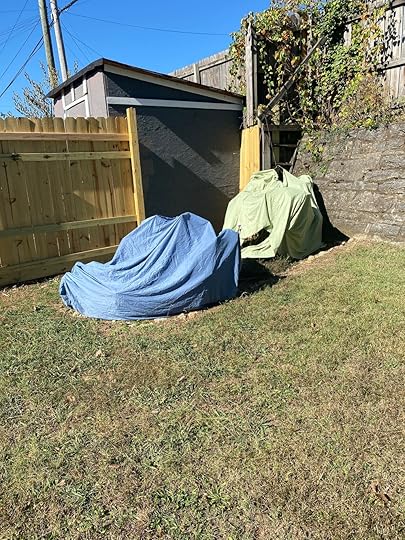
My garden of old sheets.
It’s been summer weather in Nashville, which I have to say I don’t mind, but even in the south the Earth circle the sun at the same rate, i.e. the days get shorter and the nights stretch well into the morning. On Halloween, as is typical in Nashville, we had a sudden freeze. Suddenly, it was in the 20s overnight and only reaching to the high 40s during the day. I noticed that it jump-started certain behaviors that I tend to associate with winter even though it will be back into the 70s this weekend.
I’ve been adding ‘cover/uncover’ the plants to my to-do list the past few days. On October 30th, I did a final harvest of tomatoes and peppers, knowing any fruit left on the vine probably wouldn’t survive the freeze, covered or not. I may get a few more peppers and a couple of late tomatoes into Thanksgiving, but we’re in the home stretch.
I basically began the process of powering down the garden.
The sun sets so early now I no longer want to sit at my desk and write by my big windows after work. Instead I’ve been surging through my to-do list as quickly as possible and prepping myself for bed as early as I can. I now want to write snuggled up in bed with lots of blankets and cats on my legs. Even when it was warmer, I was moving in this direction as it grew darker.
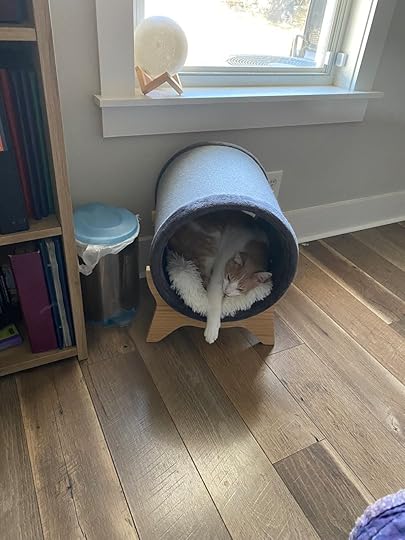
Even Aang has swapped from sleeping in a basket in the front room to the cozier circle in our room.
We put orange and purple lights up for Halloween. Much of our outside decor is fallish, so that it can be used through Thanksgiving as well. (With the removal of a few pumpkins.) I like to leave the lights up until after Thanksgiving when we swap them out for Christmas lights. The reason for this is entirely based on my early morning runs. I like a little light when I leave the house. It brings me joy.
I’ve been lighting candles and incense more. I wish we had a fireplace, but we don’t, so I’ve taken to starting tiny fires around me. I enjoy the glow.
We do have a portable gas fire pit. I LOVE the fire pit. The past few days have been too cold for it, but tonight an author friend is coming over to discuss the recent read of one of my manuscripts and we’ve excitedly discussed bringing out the fire pit and blankets so that Dean can do his videogame streaming in the living room without either of us bothering the other. I have been looking at the forecast tonight, wondering if I might get some firepit-side-writing in before bed-writing time.
I have book events two weekends in November and then I’ll be heading home for Thanksgiving immediately. Dean and I have been discussing travel plans for both holidays. I’ve been applying to book festivals that take place in 2024. The year is winding down.
And I’m actually here for it.
In Chicago I used to dread the first snow. Genuine sadness crashed over me along with that first cold snap. I just knew it was going to be long, hard, and painful. (Winters in Chicago are not just uncomfortable, they are painful.) So although I did have several obvious seasonal shifts—crime shows to Friends reruns, watching movies on the couch to wind down to reading in bed as soon as possible—I never looked forward to this time. I never relished it, I never appreciated it, I would have gladly put myself into hibernation until it was over.

There’s something about writing next to fire.
Now in my fourth year living in Nashville, I find I’m enjoying this transition. I’m looking forward to the shift. The focus on family gathering and holidays from the hustle of book travel and networking, the writing and creating in my dark candlelit den as opposed to the editing and marketing launch I’ve just completed. Soups instead of grilled veggies. Red wine instead of white. Hot tea instead of sparking water. Blankets and candles rather than tank tops and patios. Don’t get me wrong, I love ALL of those things, and I am still a die-hard summer girl, but everyone needs a change and a break. We are cyclical beings on a cyclical world, and for once, finally, I’m looking forward to the entire cycle instead of just my favorite parts.
October 27, 2023
How to deal with negative reviews.

I recently had a fellow writer ask me to do an entry about negative reviews and how I handle them. At the time I was like, “Ehhh, I don’t want to talk about that this week, but I’ll put it on the list.” I can’t remember exactly why I didn’t want to talk about it, but I had probably just received a negative review. This week I feel ready! So let’s dive in!
As with most critical things, there is a mental and emotional component to reviews. There is no way around this. No matter how mentally prepared you are for that first negative review, it’s going to hit you in the emotional feels. In this respect, it’s good to know how you react to criticism. Are you someone who gets defensive and hurt right away, but then cools off just as quickly? Or will you ruminate on it for days? Are you someone who’s able to look at it objectively and then put it aside? Consider these things as we go through, because they apply to most forms of critique, even if you’re not someone getting book reviews.
First, some fuel for your logic box:
Realize that you cannot be all things to all people. It would be great if everyone on Earth loved your work. It’s just not going to happen. There are going to be people who grabbed your book on NetGalley or Book Sirens because it was free at the time and then it just wasn’t their thing and they have to tell the world about it. It wasn’t their thing. Try not to take it personally. Even if they were mean and yelled in all caps for paragraphs.
Some people really enjoy one-starring things. This is a true phenomenon! There are people who take pride in throwing a one-star on something and just blasting it. They think they sound smart, they think they’re edgy or different, they think it’s cool to hate on things, or they just think they’ll get more attention. This is rarely a reflection on you. You were just in their sights.
They thought they were getting something else. This will happen more often if you’re a genre blending author, but it can happen to anyone. They thought they were getting a horror story and your book is more of a thriller, thus they’re disappointed and leave a negative review. Or your book wasn’t the RIGHT horror for them. It happens and there’s nothing you can do about it.
They would have done it differently. There may be people that write a critical review that seems legit. These are sometimes the worst because they have you questioning things you did that you cannot change because the book is published. For instance, I had one that felt everything wrapped up too quickly and they wanted “more” at the end. Well, originally there was more and the epilogue was twice as long, but it was objectively too long and we had to cut it. It was the right decision, but (for me) these are the reviews that hit hardest because you want to write back (never write back) and explain to the person why it is the way it is. Just realize that nobody would have written the exact book that you did and there are many people who would have taken your concept and done it differently. And that’s okay.
All of that is well and good. You can realize those things in your brain and know them as facts and you’ll still get hit in the feels a bit when you get that negative review. Here are some things I’ve done when I just can’t handle any gut punches, or have just taken one, and am having trouble shaking it off.
Go look at the one-star reviews of highly successful authors. They all have one-star reviews. I guarantee. Even better, go look at the one-star reviews of an author YOU think is amazing. The one that makes you say, “Man, if only I could write like that.” I don’t know why this works but it always makes me feel better. If they can get a one-star, then there’s nothing so wrong with me.
Filter your book for five star reviews and only look at those for a while. There are filters on both Amazon and Goodreads that let you search by star rating. I sometimes just go to the four and five stars and check those out to see if there’s anything new. Sometimes I look at all of them, but only when I’m feeling pretty secure.
Have a friend check your reviews for a while and just stay away. I did this early on before my book launched and NetGalley reviews were coming in. At first it was great! Everyone loved it. Then I got a really mean one-star immediately followed by a couple of two-stars. I asked my friend to check it out occasionally and let me know if anything good came in because I needed some time off. I knew I would continually wonder if something new was there, so this saved me from peeking “just to check.”
If one really gets you, talk to an author friend. Sometimes you just need someone else who’s been there to hash it out with. If they’re really awesome, they’ll go read the review and make fun of it for you. :-)
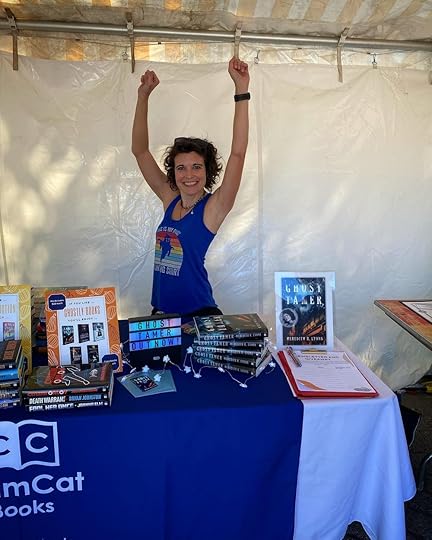
Overall, if reviews get in your head, don’t read them. Remember, you wrote the thing, you’ve already thought every terrible thing about it and probably every good thing. The book is done, it’s out there, it doesn’t matter what the reviews say. (Now, if they’re accusing you of writing something sexist, racist, homophobic, etc, and you haven’t had a sensitivity read, and you’re getting multiple reviews stating this, you may want to look at some things, but that’s a whole different blog.)
A few things to remember:
Even the bad reviews jog the algorithm, which puts your book in front of more readers.
They presumably had to read the book to leave the review, so unless they’re an ARC reader, they bought it or checked it out from the library. Either of which is good for you.
You wrote a goddamn book. They didn’t.
October 20, 2023
Body Doubling for Writing Motivation
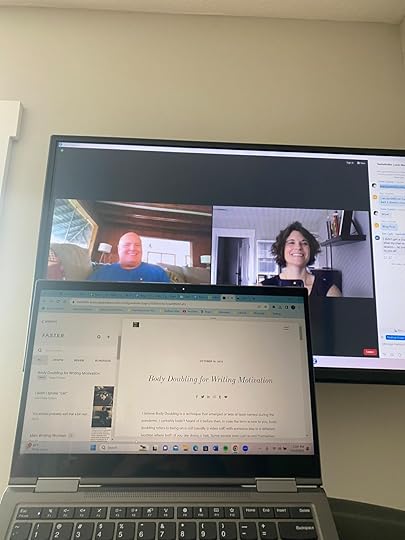
View from my treadmill desk of a body doubling session during a break.
I believe Body Doubling is a technique that emerged or was at least named during the pandemic. I certainly hadn’t heard of it before then. In case the term is new to you, body doubling refers to being on a call (usually a video call) with someone else in a different location where both of you are doing a task. Some people even just record themselves doing something, like cleaning for instance, and post a timelapse version of it on their social media later as a form of body doubling.
Whatever you want to call it, I’ve found it works. And it works best when a formal declaration has been made. (At least for me.) I’ll expound.
The first time I tried body doubling was about a year ago when one of the writing groups I frequent decided to do a team NaNoWriMo. I had never done a NaNo before, and it felt like some kind of rite of passage I’d been missing, so I decided to join. (I won’t be talking about general NaNo impressions in this entry, I’ve done that before, twice in fact, but strictly the effect of body doubling.)
As the group is a fully online group, the moderators thought it would be fun to designate writing sessions via Zoom using a Pomodoro timer. Most of the sessions were at 5 a.m. which is when I work out. I wasn’t going to give up my early morning workouts, so I jumped into the lunch sessions, which, from my understanding, were more sparsely attended, but I still got a lot out of them even if it was just me and one other person.
Since that time, I’ve tried body doubling with other writers, and it works! This is the process I’ve found most effective:
Choose a time in advance. I believe this is helpful because you’ve already got it in your head that you’re going to write during that time, rather than just some nebulous hour when you’re finished with work and chores.
Allow about five minutes for general catching up and to state your goals. But try not to get too chatty. You’ll have breaks. Even if your goal is just to get as many words as possible the entire time, stating a goal still helps. Some people will decide to edit a passage, or create an outline. Whatever you need to do, just say it aloud to your partner(s).
The Pomodoro framework seems to work well. Twenty-five minutes on the clock to work, then a five minute break to discuss what you’ve done and adjust goals if necessary, then twenty-five more minutes of work, and a five minute break to decompress and let everyone know how you did. (You can add on another if you have time, or as many as you want. Two fits in a lunch break.) You can find online timers that you can share so that every member of the group is looking at the same countdown. (Here’s one we use.)

Work time. Cameras off.
It’s as simple as that. And I’m not entirely sure why it works so well. I believe one large factor is the motivation to keep on task and avoid clicking over to social media or other windows. It’s very easy to pop into another tab to research something and find a synonym and then just start clicking around or go down a rabbit hole. When I’m in a body doubling session, I find that I’ll just mark those places to go back to later and keep writing. My head stays in the space it’s supposed to be at and it keeps me from just clicking over to Facebook when I hit a tough spot and my brain just wants to go play instead.
A few things to watch out for:
If you have members that don’t get a lot of social interaction throughout the day, they may have a tendency to over-chat during the breaks or before the timer gets started. It can feel rude to interrupt (especially if you’re a group composed mainly of southerners, like mine is) but almost everyone gets irritated afterward. Establish a moderator if there isn’t one in the group and have the moderator keep everything on task. I’ve also personally just gone ahead and said at the beginning, “Okay, everyone, I really need to start and end on time today because I have a meeting immediately after this session.” Expectations are set and everyone is aware. Then if they hour hits and your chatty person is still chatting, I simply say goodbye, that I have to go to my meeting, and log off. Many writers are retired, or have flexible employment, so they’re not doing it intentionally, they just forget the for some people the lunch break ends when the lunch break ends.
Getting overly competitive. I ran into this problem with my first couple body doubling sessions. I’m a fairly competitive person to begin with, so I wanted to outdo myself each time. I got a lot of words in, yes, but I had to go back afterward and do a lot of culling and rearranging because I was just letting my fingers fly as fast as they could. The point is not to create additional work for yourself later beyond the normal editing that you would do.
Relying too heavily on your body doubling sessions. (If they’re regular.) I still think it’s valuable to have time to yourself to write and whatever pace you like and to thoughtfully explore aspects of your scene or research a tough one as you go. I love the big chunks of things I accomplish during a body doubling session. (I’ve got four minutes left and I’ll be finishing this blog during our first Pomodoro.) But I like to think of it as a way to push yourself past a stuck point, or to really get some focused time in, rather than using it as the only tool to write.
What tools have you used to get words on the page? Have you tried body doubling? If so, how did it go? If not, do you think you might?
October 13, 2023
I wish I spoke “cat.”
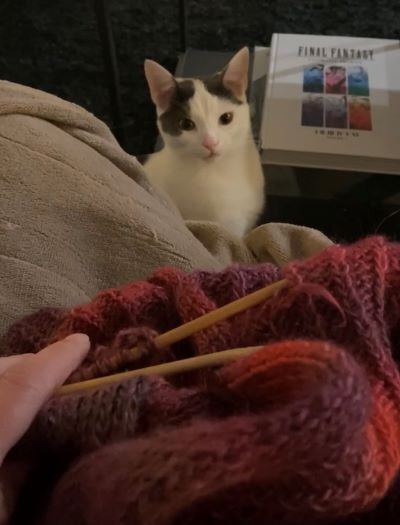
Cloud. Watching me knit and plotting ways to steal the yarn from between my fingers.
I’ve owned cats for most of my life. I’ve had various feline personalities bless my life, so I believe I’m a pretty decent judge of cat character. At least with my own cats.
Cloud is a very smart cat. He’s also a cautious cat and he remembers anything that’s bothered him. Ever since they were young, Aang was always the one who would explore a new situation first. He’s also the worst in the car and is afraid of thunderstorms, but he will happily spend hours outside on his leash while cars zoom by on the roads bordering our yard. Cloud was scared once by a loud engine revving—the cat vaulted five feet straight up in the air, squirmed out of his leash, and hid under the shed—and he is no longer willing to spend any time outside. He doesn’t like when we go out there without him, but as soon as he hears a car engine, he’s scratching at the door to go inside.
When I got home from San Diego in August, I noticed a bald patch on Cloud’s inner rear thigh. We didn’t know what it was and it was difficult to look at and photograph because we have to flip him belly-up and straighten his back leg. I did the free online vet with Chewy and they said to keep an eye on it, but it didn’t look like it was getting better, so we took him in. He was tested for ringworm (negative) and we were given some cream to put on it and a cone of shame.
Cloud did not like the cone of shame.
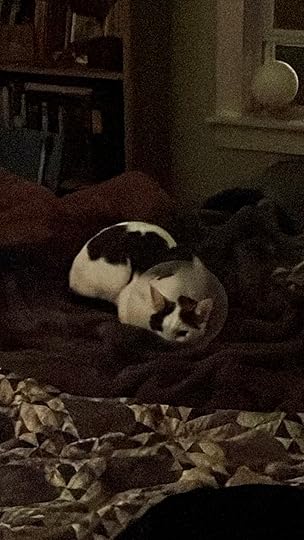
At first, he went nuts and continued to back up and back up until he was running into things. He would try to run and get the edge caught on furniture. He was so distressed I actually went outside for a while and let Dean watch him. We kept it on until we thought the medicine had soaked in and then took it off.
The next time we put it on him, he wedged it under furniture until he was able to pry it off his head.
We next went the distraction method. We’d put the medicine on his leg and immediately give him (and Aang, because you have to) treats. This seemed to be working. We were relieved not to have to use the cone anymore.
Fast forward and after a little time of the sore getting better, I feel that it is stagnating. I mention this to Dean and we try to send another picture to the vet, who has stopped responding. I start watching Cloud more and Dean and I noticed that he is still licking his sore spot and often aggressively licking.
Cloud is one of those cats that has to be destroying something to relax. We keep a rotating herd of boxes on the floor of the living room so that he can sit inside of them and then rip them apart with his teeth while he chills. Little fragments of cardboard end up scattered all over the carpet ringing the box of the hour. He used to get on top of our kitchen cabinets and chew the corners—that was an ordeal—and we eventually had to scrape Irish Spring on the corners until he stopped before we could sand them down, refinish and repaint them.
I’ve been getting increasingly more desperate to keep Cloud from licking. I even tried to have a heart-to-heart with him. “It’s not going to heal. You need to leave it alone. If you don’t leave it alone, I’m going to have to put the cone on you.”
I even tried spraying Bitter Yuck on the spot after medication. Instead of deterring him, I think it made him even more determined to get the area clean. And it made him angry with me.
Today, in desperation, I put the cone back on him again.
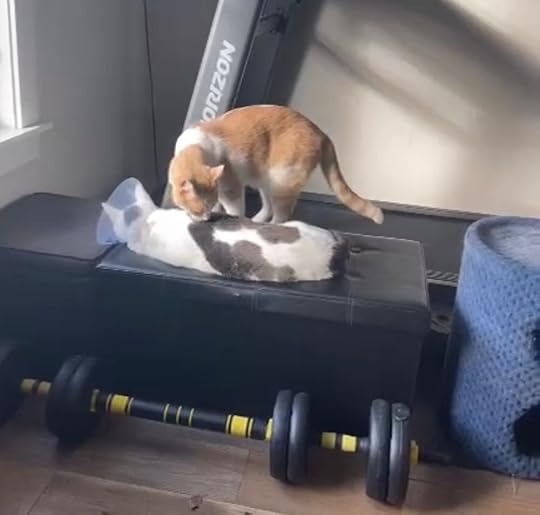
Aang giving Cloud a few comforting shoulder licks.
He was depressed, acted weird, and basically laid on my bed all day. (Once he figured out that he was still able to jump up there with the cone on.) As of this writing, he has managed to get free of it, but that was a good several hours. Dean and I are now considering doing the medication and cone in the morning.
I am just beyond frustrated and sad that I can’t communicate to him why we’re doing this and get him to just leave it alone. He’s smart enough so that he knows I don’t want him licking that spot, so now he avoids me if he’s going to go after that area.
I hate that we were just getting to be good buddies and finding our nighttime/weekend morning cuddle routine and I have to make him angry at me. I’m even more pissed that it doesn’t appear to be doing any good. The only nice thing is that Aang seems to babysit Cloud a bit when he’s coned up.
As of this morning, he has learned how to lick his wound around the cone. I want to collapse in despair. Instead I got online and ordered a long-sleeved jumpsuit for cats that should cover the wound. At least this won’t impede eating and drinking (and litter boxing) and fingers crossed he won’t be able to get out of it.
Since I still needed ten dollars for free shipping, I bought both the boys some toys to share also. Keep your fingers crossed for us. And I’ll include Cloud-in-jumpsuit photos in next week’s email announcement.
October 6, 2023
You should probably edit that a bit more before you submit.
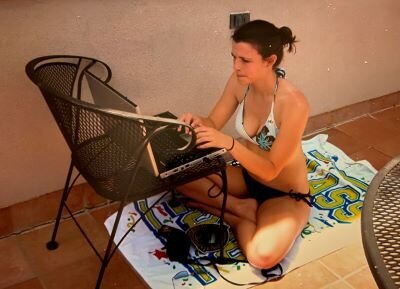
A younger Mere. Pretty good at writing online articles, not yet a novelist.
Everyone submits too early when first starting out.
I am guilty of this myself, but allow me to give you the benefit of my hindsight and ‘years later’ experience. Most of this advice is going to be for those going on submission for the very first time, either to get an agent, or direct to publishers without an agent. I welcome additional tips in the comments either way.
First, let’s look at why people might submit too early:
General ignorance. This was me. I genuinely thought my manuscript was ready and that there was nothing left I could do to it. To an extent, I was correct, but more on that in the next section. Basically, I didn’t know better.
Excitement. The book is done! Yay! I want it published now. Totally normal feelings, and you should definitely celebrate the completion of your manuscript, however, the reality of publishing is that nothing ever happens “now.” It always takes months to years. It just does.
Your friends are all on submission. I have felt like this. Everyone else always seems one step ahead and you’re just itching to be in those trenches too. (Take a breath, it’s not all it’s cracked up to be.)
Your dream agent has a short submission window. You’re much more likely to snag an agent with a polished manuscript. It’s so much more difficult to stand out from the crowd than it used to be, and if the manuscript is sloppy the intern managing your agent’s desk is just going to pitch it.
Now, let’s get to a few, very basic, things to never, ever do:
Never submit your first draft. It is not ready.
Do NOT submit your NaNoWriMo piece right away.
Do not blind submit without carefully researching what the agent/publisher accepts first.
“But how do I know when my draft is ready?” you may be saying. If you’re just starting out, this can be tricky. But here’s a story that I hope will help.
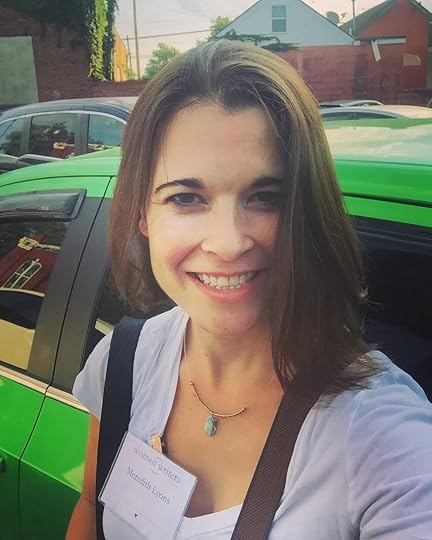
Me at that first conference. I locked my keys in my car IMMEDIATELY upon arrival.
When I first had a manuscript that I thought was ready, I had just moved to Nashville and didn’t really have any other writer friends to run it by. I had taken a writing class in Chicago and did my best. I read over the manuscript by myself, then let it sit for two weeks, then read it again, made some changes, let it sit, repeat. Until I couldn’t do anything else with it. The problem was that I had some fundamental writing mistakes that I wasn’t aware of and had no one else around to point it out to me.
I went to a writers conference with this manuscript and it was incredibly helpful. I did pay to get a one-on-one with an agent, and she did give me feedback on my manuscript which was invaluable. But obviously I didn’t get an invitation to submit and if I hadn’t had a plethora of mistakes, maybe I would have. I noticed while I was there that everyone had a writing group or beta readers or someone outside of themselves to read their manuscript. I didn’t have that and no one could really tell me how to go and get it.
I made a bunch of connections and when I got home I emailed them all. A few wrote me back once, but largely they didn’t keep in touch. I finally went to MeetUp.com and signed up for a bunch of writing things and found a writing group that anyone could go to with five pages. It was terrifying, but I did it and not only was I forced to read my pages out loud—a horrific experience, and one I still do not enjoy, but a necessary part of growth in my opinion—but I had to sit silently, one of their rules, while critique was given, and then I received written edits on my pages.
It was fantastic.
To cut the rest of the journey into a digestible summary: I attended meetings regularly, broke out into another, more intimate group, and eventually found several beta readers through that process. I grew by leaps and bounds once I had outside input. I recently found a draft of my early writing on my computer as I was cleaning out my Google Drive and… let’s just say I have come a long way.
In a nutshell: you need someone else with writing experience to read your work. If you don’t have that, you won’t get very far. I want to drive this point home. I was not a bad writer before this. I wrote news articles for CBS Local, I submitted online articles to the now defunct Examiner.com for years, Honors English was my best class all through school, I was hitting the ceiling in that subject on all the standardized tests. Just because you’re a good reader and have talent as a writer does not mean you’re not making fundamental mistakes that you cannot see. Trust me.

One of my betas. I love her stuff and she loves mine. We will still give each other truth if we need it. And yes, I finally stopped flat ironing the shit out of my hair.
I’ve heard the argument before, “Why spend so much time editing? When you get an agent/editor, aren’t they just going to ask for more edits?” Yeah, most likely.
But you want your work to be at its absolute best before you get to that point. Once you get the right editor, one who sees what you’re trying to do, but is also far enough removed from the work to see the entire forest of fantastic trees you’ve created, they will help you elevate your work and push you to make it even better in ways you wouldn’t have been able to see on your own.
The tricky part is wading through the feedback in the early days, because all feedback that is not glowing praise will sting a little at first. You just have to learn to sort through and find out what’s helpful and what is ultimately not going to serve you. Helpful feedback:
Usually points out an issue that you probably knew was there but were hoping you could get away with. Nope. You cannot get away with it.
Will at least try to give you some suggestions on how to fix the problem.
Is more nuanced than, “I just didn’t like this part.”
May irritate you at first, but then if you sleep on it for a day or two, you may realize that it’s actually correct.
Still supports the overall vision/goal of your story.
Unhelpful feedback:
Can simply be mean. Yes, it sucks, but often times people are just rude when giving feedback. Once you realize this, you can take this person with a grain of salt if they’re in a group you otherwise enjoy, or just solicit feedback from someone else.
Can come from someone who does not read or write in your genre. I was a fantasy author in a group of all thriller writers for a time. There were many points where they wanted me to clarify things like ‘fae’ and ‘glamours’ which would have been very accessible to a fantasy reader. It’s not always bad to get feedback from a writer outside of your genre, but you have to know what to discard. And it is more helpful if they at least read in your genre.
Can come from a person who is unable to separate the book you are trying to write with the book they would have written in your place. Without going into too much detail, because this book is on submission, I wrote a book that involved space travel. I solicited a ton of feedback. Too much. Looking back I had too many eyes on it and the amount of suggestions for places I could take this book was overwhelming. I had a few people though, who suggested that instead of traveling to a different planet, I go to a different dimension on our planet. It was a cool idea, but not the type of book I wanted to write.
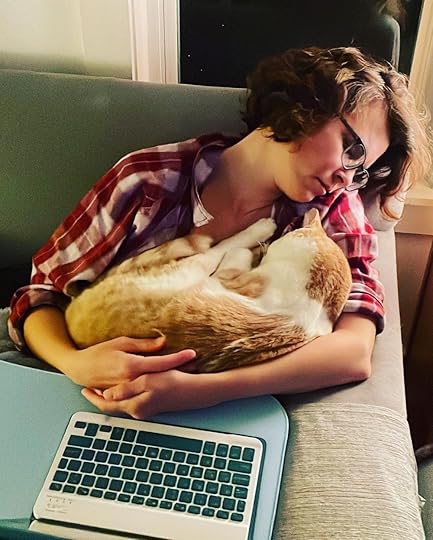
I’m exhausted listening to myself.
This post has become very long and rambly, because I am writing the advice I would have liked to give my past self. Unfortunately, it’s incredibly nuanced because this is a barometer I do believe you have to develop through experience. My younger self would have really enjoyed a roadmap though. She would have liked bullet points and a direction. So I will try to give you a rough one.
If this is your first finished book, you think it’s great, and you want to submit it to agents and get published, and you really want a map, here’s one that would have benefited young Mere:
Let it sit for at least two weeks. Don’t touch it. As Jeff Goldblum would say, “Go outside and blow the stink off ya!” Do something else for two weeks. Read some books. Watch some movies. Or, if you’re like me, and this is kind of impossible, start writing something else. (But also go outside and see some friends.)
After two weeks, read it again. I have a friend who has Word read her work back to her. I haven’t done this yet, but I think it’s a great idea because your eyes will often fill in things that you haven’t put there. Missed words or missed intentions. I used to print mine out and read it like a book rather than on a computer so I could make physical notations. This works too, as a different medium, but it wastes a lot of paper.
Make your changes. If you haven’t made very many, you’re probably missing something unless you're a big plotter—I am not—and you spent a lot of time before your first draft plotting your scenes out.
Pick your beta readers. If you’re new, you may not have a lot of choice, and that’s okay, just get someone to read it. If you’ve been around the block once, then try to pick people who read in your genre who like your writing. If they don’t like your stuff, you don’t want them to read it. This may come as a revelation—and it does suck, friends—but some people are going to dislike the things you write. You should also—and this is very important—you should also like what they write and respect their opinions.
While your betas are reading, you can start getting your submission material together if you like. Get your pitch prepped. Then get your one paragraph pitch. Then get your one sentence pitch. Find your comp titles. If you can’t comp the whole book, comp elements of the book. (This is what I usually do.) Start researching agents you think will like your book. Make a spreadsheet. You can even write your query letters and save them so that they are at the ready. In your montage, this is your troop rallying, map drawing, weapon polishing time. (Also, hang out with friends, read a book in the sun, play with your cat.)
Decide how you want your feedback. I like to have a Zoom meeting with my betas if we can agree on a time. The reason I like this is because they will often come up with solutions to problems together like a little think tank. Also, they can disagree with each other, which is helpful for me. If I have three people and one person hates a concept, but it doesn’t bother the other two, I can decide how I feel about it. If all three of them agree that something needs to be done, I need to take note. You may not like this, or your betas may not be down. You’ll figure out what works for you.
Take copious notes. Do not argue. If they ask for clarification, give it, but do not defend yourself. Resist the urge to defend your book child. Just write it all down. Just. Write. It. All. Down. Remember you picked these people for a reason.
Sleep on it for a day or two. Hang out with friends. Read a book in the sun. Play with your cat. Have a stiff drink.
Come back and look at the notes and decide what resonates with you. Ask yourself, “Do I resist this feedback because it does not align with what I’m trying to create, or do I resist it because it’s hard to do?” You’ll find you know which bits will make your book better, you just don’t like them because they’re difficult and you wanted to be done. Decide which ones you will do. Feel free to have another drink.
Incorporate the feedback. Take a few days. Read it back to make sure it makes sense.
Run spell check. On your query letters too. Make sure everyone’s name is spelled correctly including yours. Nothing more mortifying.
Go forth and submit. And may the odds be ever in your favor.

While you’re on submission: Pet a cat. Have a drink.
September 29, 2023
Men Writing Women
You’ve seen it before.
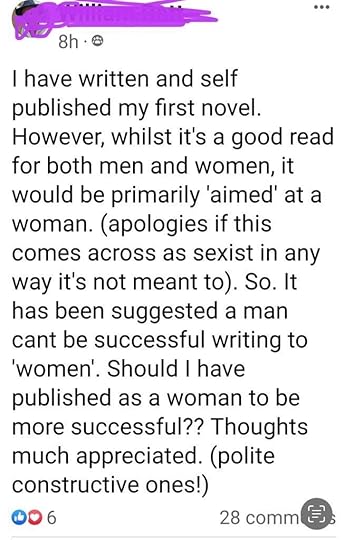
Don’t do this.
You may even be familiar with the Twitter hashtag or the Subreddit. But before you go too far down those hilarious rabbit holes, let’s chat with some women writers about the main pitfalls they’ve seen when men (sometimes honestly trying their best) write women characters and what they can try to do better.
While it would be easy (and hilarious) to pull screenshots or quotes from the multitude of examples where this has gone laughingly wrong—women “holding in” their periods for greater effect, for instance—in this piece, we’re going to attempt to give some honest advice to the men trying to be better. (Although I can’t promise not to include screenshots as illustrations.)
A few general thoughts to remember:
Women are not usually fascinated or even preoccupied by their own breasts.
Women are not as visually motivated as men when it comes to sex.
Although society has deemed it more acceptable for a woman to express her emotions, most of us do not cry all the time.
Women have no control over the flow of their periods.
Now that that’s out of the way, let’s address the nuances of the typical #menwritingwomen pitfalls. “Put [your women characters] in heels and makeup if you choose,” says Audrey Lee, author of The Mechanics of Memory. “But don’t lead with their stunning beauty or, conversely, with their wish to be stunningly beautiful while comparing themselves to other women.” A major complaint that many of the women I talked to voiced was that often women are boiled down to their looks when written by men. And yes, we do want a mental picture of the character, but one tip is to check how you’ve described the other characters in your manuscript. Are the women the only ones getting their body parts in print?
“Limit physical description. Let your readers fill in the blanks,” advises J. L. Delozier, award-winning author of The Photo Thief, Con Me Once and the Persephone Smith thriller series. “It’s more fun that way for the reader and you avoid landmines that way. Never describe a woman’s breasts. Ever.” Once again for the people in the back. EVER.
“Tame the body parts references!” Agrees Melissa R. Collings, author of The False Flat (Coming in 2024). “Women don’t think about their breasts during a conversation. To women, our body parts are not novel wonders, they’re just body parts.”
Now let’s address the emotional elephant in the room. Women are often perceived as more emotional than men, which can lead to one of two undesirable outcomes:
The woman who cries at the drop of a hat.
The woman who’s “not like all the other girls” because she doesn’t cry at the drop of a hat.
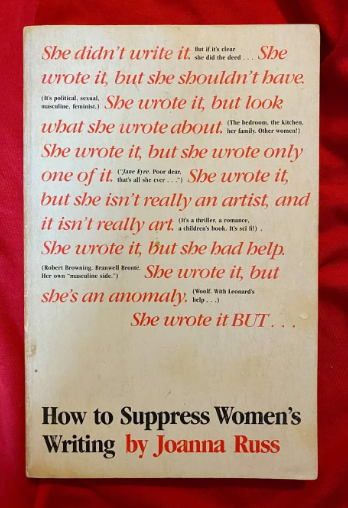
While we’re on the subject, I’ll just leave this here.
It’s okay to have your characters cry, but almost every human who feels the urge to cry will try to repress it at first, sometimes successfully! Even in Ghost Tamer, which is a very emotional book about grief and loss, I pulled back on Raely’s actual tears, consciously limiting her crying scenes, and she fought against the emotion the whole way. (She was also pretty funny, in my opinion.)
“Make your female characters dimensional and complex,” says Lee. “Give them a depth and drive that comes from a universal human experience. Make their emotions, insecurities, and high EQ an asset and not a personality flaw that needs fixing.” Women are, first of all, humans. And every human has experienced every emotion by the age of ten. We may not have had the same experiences, but we’ve all experienced some kind of loss, grief, love, happiness, et cetera. My personal advice is to write the human first, and then see what additional information is needed.
“Run it by a woman if need be and check yo’self!” advises Collings.
“Avoid tropes – the voluptuous femme fatale. The perky—God, how I hate that word—best friend. When in doubt, ask a female friend/beta reader if your female character rings true,” adds Delozier. This is sound advice. Would you want to be condensed down to a stereotypical, football loving, beer guzzling, insensitive, inattentive Homer Simpson caricature? Get a woman friend or colleague to fact check you. And not a romantic partner or your mother. They’re too close to you and have a higher probability of empathetically reading the ‘intent’ behind your words. Get someone who can be objective.
Jackie Johnson, author of Bladestay also advises against adding women characters who “exist only to move the plot of the male character forward.” She suggests checking the Bechdel and Mako Mori tests to see how you’re doing there.
Writer MT Cozzola has some practical advice. “What I really think about is how we can all write better characters whose identity markers are different from our own. I’d advise the same thing to myself when writing male characters: start with a bias dump—and make it specific.” Cozzola advises just listing out everything that comes to mind when you think of the character, on your own, never to be viewed by anyone else, and then just check it over for stereotypes or think objectively about how it might hit. “Once I have that awareness, I can make more specific choices about this character’s situation, which drives the way they speak and think on the page.”
Overall, you’re striving to make your characters well-rounded human beings that your female readers can identify with and root for. Not another caricature that takes them out of the story, has them rolling their eyes, and taking a screenshot to share on Twitter.
And if you’re curious about how our periods work, just ask us. (In a respectful manner and not while you’re drinking and hopefully we haven’t just met at a bar. Jesus.)
September 22, 2023
The best part has been you.

I’ve been trying to think of something to liken the book publishing experience to. In a way, it’s like graduating from college in that you work toward it for a very long time and then the actual graduation day comes and you’re like, “What? It’s actually happening?” You’ve had the graduation date on the calendar for over a year and that date has always seemed so far in The Future as to be fictional. Then it arrives!
But that analogy doesn’t quite work, because in many ways I think getting into college was easier than getting a manuscript into the publishing process. As it should be, I suppose, otherwise no one would be college educated.
I’m fortunate to have a couple of friends who have been on this debut author ride with me this year. It’s nice to have people to commiserate with and share the joys and triumphs with. I continually compare this experience to a rollercoaster, because the highs are so thrillingly high, and the lows are swift and scary.
As I write this, I’m prepping for my release party at Parnassus Books. I’m so excited that they’re hosting me and I have so many friends and family who are coming to support me. The amount of people who’ve donated giveaways to make the party even more fun has been incredible to behold.
Since my launch party was scheduled for Thursday, I figured the actual release day would be just like any other day. I’d throw up a post on social media, then just go to work and go to bed. I did not anticipate the outpouring of electronic affection that I would experience! I almost couldn’t keep up with it all. From people commenting on my posts with their congrats to everyone sending me pictures of them posing with their Ghost Tamer copies, it was so much fun.
Am I excited? Yes. (Am I exhausted? Also yes.) I’m proud of myself, I’m super happy that Ghost Tamer is out in the world, and I’m thrilled to be able to call myself a published author. But honestly the best part of this week has been having you all cheering me on. Thank you.
September 15, 2023
Just a light patriarchy edit: So sorry to bother you with my imposter syndrome.
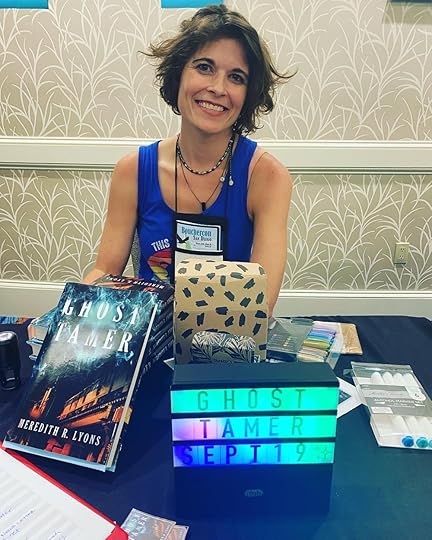
Nothing to see here. Just me and my little stories.
Many years ago, I read an article about how women devalue themselves unconsciously in so many different ways because of how society has treated us since we were young. One example was using the word “just” in business (or personal) communications. I.E. “I’m just checking to see if we’re all okay to meet at 9 a.m.”
Often this is thrown in to “soften the tone” of an email so the reader doesn’t construe us as “pushy” or “demanding” when really we’re just voicing a legitimate request or concern.
After reading that article, I consciously re-read any communication I prepared before I sent it and eliminated the word “just.” Not only was I surprised at how often I employed it, I was surprised at how difficult it was for me to remove. I felt uncomfortable. I made myself do it anyway with no adverse effects. I also started reading other people’s emails and looking for “just” and “I hope this is okay” and similar phrases.
After over a decade of doing this, I feel like I’m pretty good at it. I no longer gravitate immediately toward “just” and manage to avoid overly apologetic phrasing.
Until recently.
Publishing a book has unearthed some odd tendencies and insecurities. I’ve reached an interesting stage in my pre-launch career where my book is almost out, but not quite. I’ve sold copies at conferences, but it’s not yet available in stores. I’ve also been talking about it for so long that it feels like in some ways it is out, but it’s not. Not until next week.
And yet, with publishing, you have to pitch everything super far in advance. I had my ARCs out to people in January and asked for blurbs by April. Now I’m pitching myself to book festivals that don’t happen until next winter/spring.
And suddenly that apologetic impulse is back in full force.
It started with asking for blurbs. It’s something we all have to do. It’s a known thing. I even had people tell me in person that they would blurb my book when it was ready and I still had to psych myself up. I had to go back and delete, “I’m so sorry to bother you when I know how busy you are…” phrases.
I’m noticing it creeping in again when I apply to book festivals. Especially the super picky ones that require a lot of information. Book Festival applications are done so far in advance, I was applying to some before there were any reviews to submit. I literally ended a follow-up email to one festival with, “I hope this is helpful and not annoying.” Jesus.
I’m not entirely sure why this new landscape has dredged up a wealth of imposter syndrome. Publishing takes a long time. 99.9 percent of authors that I know worked hard at writing long before they got their first deal. I’m no exception. I’ve been writing a long time. I know how to send a professional email. I am not generally a pushy person and I often check myself with someone else before I do anything even so “daring” as sending a tweet to someone I’ve only met once. “Is this funny or is it too much?”
All that to say: I probably don’t need to worry about “being annoying” even half as often as I do.
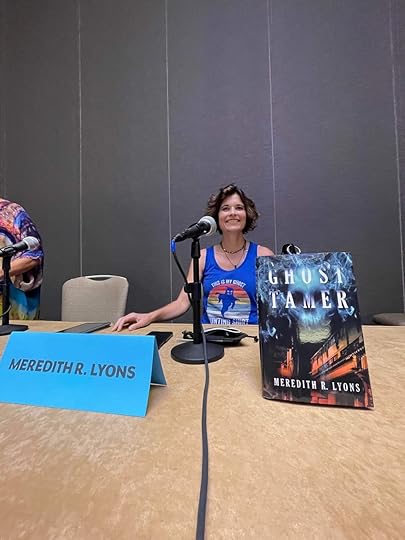
“Just pretend you belong, self. No one will notice that you’re faking it!”
I know that men experience imposter syndrome also, but I wonder if they feel the same paralyzing fear of being “annoying,” “pushy,” “abrasive,” etc. I asked a male author who debuted early this year for advice on pitching bookstores as he seemed to be booking tons of events. He was so nice and even sent me his pitch email as an example. “Don’t take no for an answer!” he told me. And WOW was his pitch email bold. “This is the date I’m available, these are how many copies you should order, etc.” I’ve altered it with my own information but I am terrified to send it.
I’m fortunate in two ways. One is that I’ve changed careers at least four times in my adult life and know how to force myself to take a leap. Another is that the writing community is incredibly supportive and I have author friends who are there to (gently) smack me when I spiral into self-doubt.
I’d love to hear from all genders on this. Do you have to go back and edit out your apologetic language? Or do you just jump in with both feet? (If so, teach me your ways.)
September 8, 2023
On interspecies relationships.
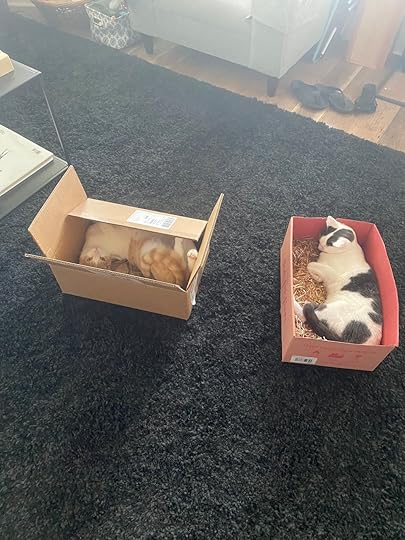
Yes, there are a certain amount of boxes that we just leave on the floor for their pleasure.
Have you ever thought how strange human beings are?
Somehow we’ve normalized collecting certain animals and keeping them in our dwellings for the sole purpose of bossing us around. Mostly dogs and cats. We do collect other things occasionally, but it’s mainly those two that really run the house. You can have a fish, a bird, a snake, etc., but since they’re usually in a confined space, they don’t end up with the absolute power to rule that the other two do.
I’m not complaining.
Most of the pictures my husband sent me while I was in San Diego were of our two cats. Hell, we send each other cat pictures from the other room from time to time. We care for them like they’re little humans. It’s wild! Just the other day, my friend was telling me about her rough day and capped it with the fact that her daughter might have pink eye. One of my commiserating responses was, “Cloud had pink-eye when he was a baby. It was annoying but it cleared up fast with medicine.” Like we were having a conversation about similar beings.
Another friend of mine fosters puppies. (In addition to having her own dogs and LOTS of fish.) She was driving around today running puppy errands and giving me advice about Cloud, who Dean had to take half a day off work to take to the vet.
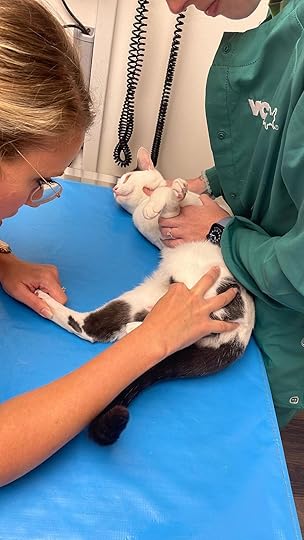
Brave little Cloudy at the vet.
Yes, he took half a day off work to take Cloud to the vet. Cloud has a sore on the inside of his hind leg that I noticed the day after I got back from San Diego. I did the free online vet chat and they recommended some antibiotic wipes, which we tried, but it was looking more red and raw, so we took him in. They gave us additional medicine which we are to alternate with the wipes and did a culture for ringworm. He got another vaccine he was apparently overdue for. All total this was near $300.
As a person with shitty insurance, I can say that this is comparable to a human doctor visit.
Now, don’t get me wrong, this is all right and good. If we’re going to take animals into our homes, we make a promise to care for and protect them. (Similar to the promise you’re making to a child if you choose to become a parent.) If you can’t provide an animal with love, care, and safety, you shouldn’t bring one into your life.
That said, isn’t it so weird when you think about it? We, humans, go out to find a non-human creature to share our lives with. We venture forth and pick one out (or the universe plunks one into our path), then we bring it into our house and live with it. It sleeps in our beds, it runs all over, it leaves behind hair, we deal with it’s poop, it destroys things, and occasionally requires chunks of cash, but we love it and would do anything for it.
Cloud has this thing he does where whenever we go to clean the litter box, he runs in and shoves us out of the way so he can get one last deposit in before we scoop. Thanks, Cloud! He also likes to come into the bedroom when I’m trying to sleep—he only does this on weeknights when I get up at 5 a.m.—and just yowls for no reason. Like he’s distraught that I’m resting. He does not like to be held. Until he does, and then he will follow me around and scream at me until I pick him up. We call him the goblin prince because he’s such a little creatin.
But I’ll happily pay all of his vet bills so we can get that sore on his leg healed faster. I love him.



